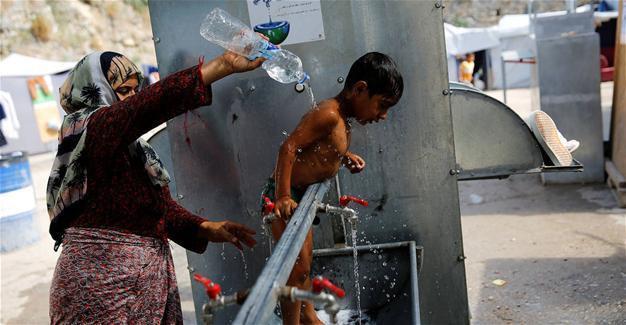EU says 1,614 Syrians resettled from Turkey under migrant deal
BRUSSELS

REU Photo
A total of 1,614 Syrian refugees from Turkey have been resettled in the EU since the implementation of a migrant deal between Turkey and the bloc, while a total of 578 migrants were returned to Turkey, the European Commission said in a report on Sept. 28.
“As of Sept. 26, 1,614 Syrians have been resettled to the EU under the 1:1 framework whereby the EU resettles a Syrian from Turkey to the EU for every Syrian returned to Turkey from Greek islands,” said the commission’s report, titled the “Third Report on the Progress Made in the Implementation of the EU-Turkey Statement.”
It said that out of the 1,614 resettled migrants, 1,103 Syrians had reached their new homes in 12 member states of the EU since the commission’s second report was published on June 15. These countries were reported as Belgium, Estonia, Finland, France, Germany, Italy, Latvia, Lithuania, the Netherlands, Portugal, Spain and Sweden.
According to the mid-March Turkey-EU deal, the union agreed to take one Syrian refugee from Turkey for every migrant who reached Greece illegally after the deal that Turkey took back from Greece.
The report stated that the resettlement process was temporarily interrupted in mid-July in the aftermath of the failed coup attempt but restarted again in August.
“The number of persons that have undergone the necessary procedures and are ready to be resettled is 509. As a result, the pace of resettlement is considerably advanced compared to returns from the Greek islands. And this pace needs to be maintained,” it said.
As part of the migrant deal, the EU had vowed to grant Turkish citizens visa-free travel inside the Schengen zone on grounds that Turkey met all the needed 72 criteria.
“The commission has continued to encourage Turkey’s efforts to complete the delivery of all seven outstanding benchmarks of the Visa Liberalization Roadmap as soon as possible,” said the report.
The report listed the following as the outstanding criteria that needed to be fulfilled in order for Turkish citizens to travel inside the EU without a visa: Issuing biometric travel documents fully compatible with EU standards; adopting measures to prevent corruption foreseen by the roadmap; concluding an operational cooperation agreement with Europol; revising legislation and practices on terrorism in line with European standards; aligning legislation on personal data protection with EU standards; offering effective judicial cooperation in criminal matters to all EU member states; and implementing the EU-Turkey Readmission Agreement in all its provisions.
Meanwhile, the report also said that it hoped to move the remaining 30,000 eligible refugees out of Greece by the end of next year, but appeared set to fall far short of its plan to share 160,000 migrants around the bloc.
The commission insisted there had been “important progress” despite only 5,651 refugees having so far been moved from Greece and Italy under the scheme adopted in September 2015.
“Relocation has to succeed,” Migration Commissioner Dimitris Avramopoulos said in a statement.
“With the increased capacity of the Greek Asylum Service, and if member states step up their efforts, it should notably be possible to relocate the remaining relocation candidates present in Greece [around 30,000] within the next year,” the commission said.
